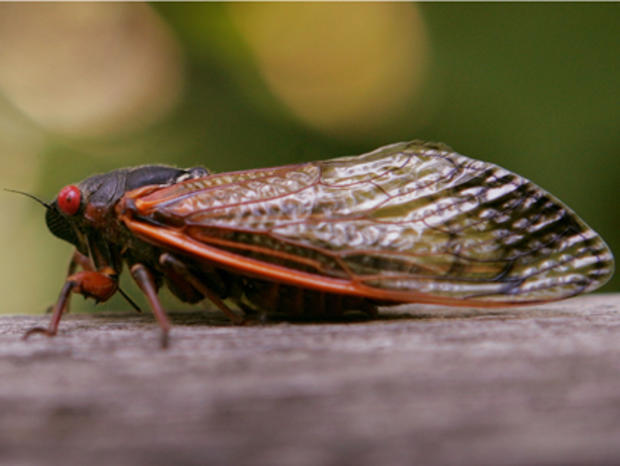Let The Music Play: Cicadas To Invade Tri-State Area For Month-Long Stay
NEW YORK (CBSNewYork) -- It's that time again.
After a 17-year slumber, cicadas will be making their unwelcome debut throughout the Tri-State Area in about a month.
Experts said the cicadas will not be out until mid to late May.
And as CBS 2's Lou Young reported, scientists said the spring and summer will bring record numbers of the noisy insect.
-->
"In places where they're going to be present, it's going to be spectacular. There could be as many as one billion cicadas emerging per square mile," Michael Raupp, a professor of Entomology at the University of Maryland, told 1010 WINS. "This is really a spectacular opportunity for children, for adults, for students to go out and learn about one of Mother Nature's rarest, most interesting events."
Cicadas To Invade Tri-State Area For Month-Long Stay
Entomologist Lou Sorkin of the American Museum of Natural History said he is getting ready for the invasion.
"It's a great thing," Sorkin told Young. "It only happens once every 17 years, but you have different broods of these, so if you're lucky in your lifetime, you have a few broods to actually go out and examine, and try to collect."
Scientists are tracking 15 different broods of periodic cicadas, insects that spend 17 years below ground and emerge with wings, flying around, making noise and mating in the last weeks of their life.
The current group, Brood No. 2, is one of the largest ever -- numbering in the billions. The Tri-State Area last saw it back in 1996.
And are they ever noisy.
"The sound is the sound of male cicadas looking for mates. And only males make those sounds," Professor John Cooley, a research scientist from the University of Connecticut, told WCBS 880's Wayne Cabot.
That mating call has been measured at 100 decibels, similar to the noise created by a subway train.
"One of the things about these cicadas that's a little bit different from the cicadas that we see every summer is that these cicadas come out in large numbers and chorus together," Cooley told Cabot.
Those who have lived with a big cicada brood know it can be trying.
"It's romantic initially, because, of course, it's males singing and trying to mate," said cicada veteran Caroline Chapoo. "But by day three, the noise was so loud that people just couldn't stand it."
That impression was clear on Long Island four years ago, during a local cicada outbreak.
This year, the activity is expected to spread from Georgia to New Hampshire, with parts of the New York Metro area seeing the largest numbers. People in northern New Jersey, Westchester and coastal Connecticut are expecting a noisy summer.
"They are annoying. They can be annoying," said Pierre Henri, "and loud."
The thing to remember is that the cicadas will not hurt you, beyond keeping you up at night and crunching underfoot after they mate and die.
And the adults only have a lifespan of four weeks.
"We can expect intense cicada activity for on the order of a month," Cooley said. "One of the things we recommend that people don't try to do is come in there with some kind of bug spray or insect killer because you simply don't have enough. More will simply come and take their place and you'll end up spraying so much bug killer that you'll kill everything in sight."
"These guys are going to be noisy during the daytime but at nighttime, they go to bed just like we do. We don't expect people to lose too much sleep over these cicadas," Raupp told 1010 WINS.
And you can always eat them. Sorkin said they are also a good source of protein, if you catch them after they molt and before they fly.
"It's like a soft-shell crab," Sorkin said. "And that way, you have a soft insect to either freeze or keep cool, and if you get enough of these, you can cook them. They taste like cicadas -- sort of a bit like corn, actually."
According to Cooley, the insects start out about the size of a small ant and spend the next 17 years eating and waiting to emerge.
After the cicadas mate, the females lay their eggs and then they die, Cooley said. The eggs then hatch six to eight weeks later and the little cicadas go into the ground to start the 17-year cycle all over again.
Are you dreading the return of cicadas? Please offer your comments below...




